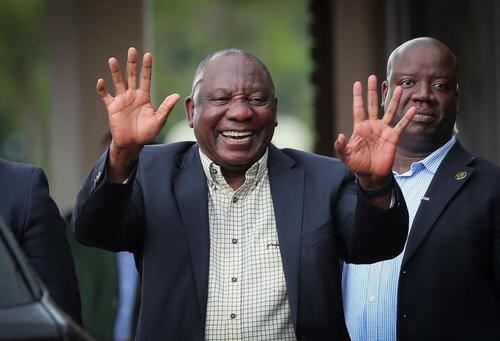
Just last week it was widely believed that scandal-plagued South African President Cyril Ramaphosa's days were numbered as leader of the country amid intensified calls for him to step down over the 'Farmgate' scandal which centered on the alleged theft of $580,000. The over half million in foreign currency was found stuffed in a sofa at a game farm that Ramaphosa owns in South Africa's northeast.
The mysterious cash payment has sparked outrage particularly among the opponents of the ruling African National Congress (ANC), which swiftly left to a move in parliament to impeach. But on Tuesday at a special session of parliament, MP's voted to reject impeachment proceedings against embattled Ramaphosa.
When the scandal first emerged at the end of last month, crucially coming at a sensitive moment for the country given that Ramaphosa-backed long awaited economic reforms had only just begun to take shape and improve the country's outlook, resignation and impeachment were quickly raised by rivals while Ramaphosa stuck by his vehement denials of any wrong-doing.

Key to his political survival has been the ANC telling its MP's to block the impeachment push, and yet a few still broke ranks, but the 70-year old Ramaphosa who vowed to tackle corruption, now having emerged unscathed, is likely to win re-election at his party's conference this month, which will lead to his becoming the party's presidential candidate at the 2024 election.
The vote was 214 lawmakers against establishing an impeachment committee and 148 in favor, with two abstentions, in a vote which required a simple majority. The allegations have dominated South African media for the past weeks. According to a brief summary of the scandal's origins in CNBC:
In what has become known as the “Farmgate” scandal, Ramaphosa is alleged to have covered up a $4 million theft from his Phala Phala farm in the north east of the country in 2020. Some $580,000 of this was found beneath sofa cushions, and allegations also include working with Namibian authorities to apprehend, torture and bribe the suspects.
Ramaphosa staunchly denies the allegations and has not been charged with any crimes. He maintains that the cash was the proceeds from the sale of buffalo. He has confirmed that the robbery took place, but insists that the amount stolen was smaller than alleged and denies participating in a cover-up.
This week leading into the impeachment proceedings vote, opposition leaders used the opportunity to paint of picture of a cover-up in progress by a leader hiding behind his 'reform' rhetoric and reputation.
On the other side of the alleged cash payment under suspicious circumstances is a Sudanese businessman...
“I have nothing to hide,” says a Sudanese businessman who has been implicated in the Phala Phala farmgate scandal. https://t.co/HY5o6SGud0
— Daily Dispatch (@Dispatch_DD) December 13, 2022
Julius Malema of the Economic Freedom Fighters party told parliament while addressing Ramaphosa directly, "You are so desperate to avoid any type of investigation into the crimes that have occurred in and in relation to the Phala Phala farm that you have decided to spit in the face of the freedoms and institutions so many people fought and died for."
And John Steenhuisen, the leader of the opposition Democratic Alliance said, "As long as you have the numbers in parliament, you can make any scandal go away and if that is how you intend to vote today, in one unified shield against accountability and oversight, just like you did in the Zuma days then shame on you."
While the crisis likely to die down in national media after the failed drive to impeach, there could be multiple investigations into the affair outside parliament, and thus more potential damning evidence or testimony might emerge.
Just last week it was widely believed that scandal-plagued South African President Cyril Ramaphosa’s days were numbered as leader of the country amid intensified calls for him to step down over the ‘Farmgate’ scandal which centered on the alleged theft of $580,000. The over half million in foreign currency was found stuffed in a sofa at a game farm that Ramaphosa owns in South Africa’s northeast.
The mysterious cash payment has sparked outrage particularly among the opponents of the ruling African National Congress (ANC), which swiftly left to a move in parliament to impeach. But on Tuesday at a special session of parliament, MP’s voted to reject impeachment proceedings against embattled Ramaphosa.
When the scandal first emerged at the end of last month, crucially coming at a sensitive moment for the country given that Ramaphosa-backed long awaited economic reforms had only just begun to take shape and improve the country’s outlook, resignation and impeachment were quickly raised by rivals while Ramaphosa stuck by his vehement denials of any wrong-doing.

Key to his political survival has been the ANC telling its MP’s to block the impeachment push, and yet a few still broke ranks, but the 70-year old Ramaphosa who vowed to tackle corruption, now having emerged unscathed, is likely to win re-election at his party’s conference this month, which will lead to his becoming the party’s presidential candidate at the 2024 election.
The vote was 214 lawmakers against establishing an impeachment committee and 148 in favor, with two abstentions, in a vote which required a simple majority. The allegations have dominated South African media for the past weeks. According to a brief summary of the scandal’s origins in CNBC:
In what has become known as the “Farmgate” scandal, Ramaphosa is alleged to have covered up a $4 million theft from his Phala Phala farm in the north east of the country in 2020. Some $580,000 of this was found beneath sofa cushions, and allegations also include working with Namibian authorities to apprehend, torture and bribe the suspects.
Ramaphosa staunchly denies the allegations and has not been charged with any crimes. He maintains that the cash was the proceeds from the sale of buffalo. He has confirmed that the robbery took place, but insists that the amount stolen was smaller than alleged and denies participating in a cover-up.
This week leading into the impeachment proceedings vote, opposition leaders used the opportunity to paint of picture of a cover-up in progress by a leader hiding behind his ‘reform’ rhetoric and reputation.
On the other side of the alleged cash payment under suspicious circumstances is a Sudanese businessman…
“I have nothing to hide,” says a Sudanese businessman who has been implicated in the Phala Phala farmgate scandal. https://t.co/HY5o6SGud0
— Daily Dispatch (@Dispatch_DD) December 13, 2022
Julius Malema of the Economic Freedom Fighters party told parliament while addressing Ramaphosa directly, “You are so desperate to avoid any type of investigation into the crimes that have occurred in and in relation to the Phala Phala farm that you have decided to spit in the face of the freedoms and institutions so many people fought and died for.”
And John Steenhuisen, the leader of the opposition Democratic Alliance said, “As long as you have the numbers in parliament, you can make any scandal go away and if that is how you intend to vote today, in one unified shield against accountability and oversight, just like you did in the Zuma days then shame on you.”
While the crisis likely to die down in national media after the failed drive to impeach, there could be multiple investigations into the affair outside parliament, and thus more potential damning evidence or testimony might emerge.
Loading…







